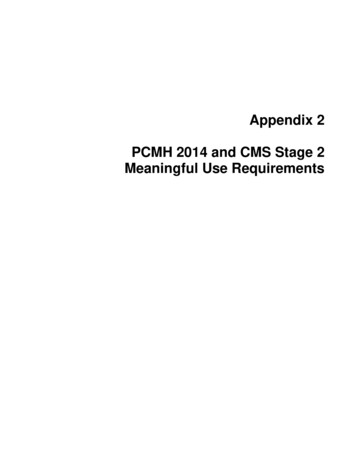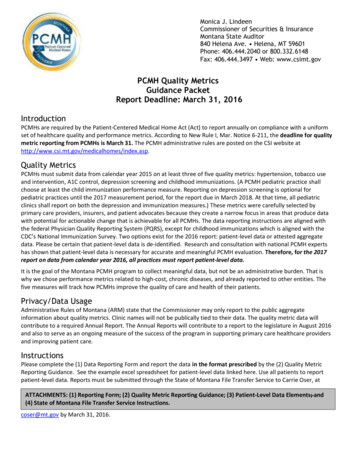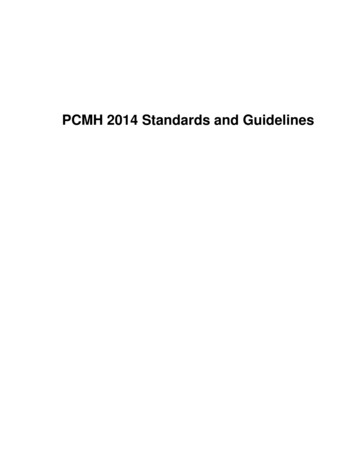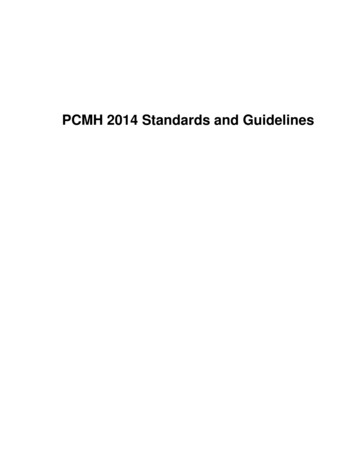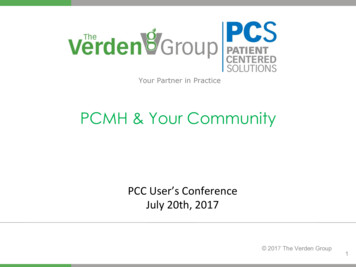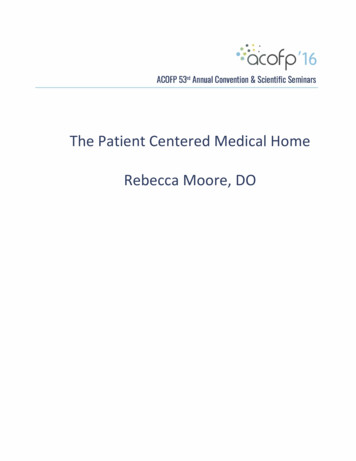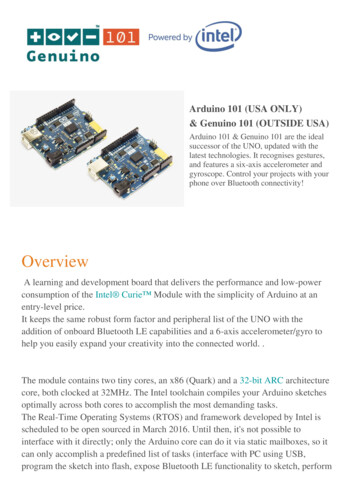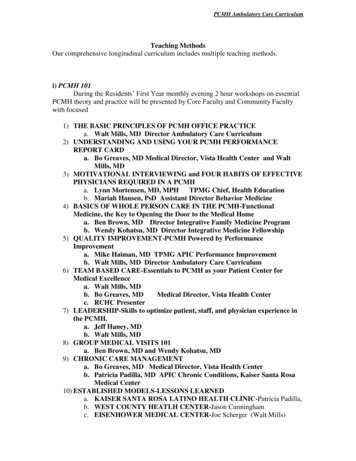
Transcription
PCMH Ambulatory Care CurriculumTeaching MethodsOur comprehensive longitudinal curriculum includes multiple teaching methods.i) PCMH 101During the Residents’ First Year monthly evening 2 hour workshops on essentialPCMH theory and practice will be presented by Core Faculty and Community Facultywith focused1) THE BASIC PRINCIPLES OF PCMH OFFICE PRACTICEa. Walt Mills, MD Director Ambulatory Care Curriculum2) UNDERSTANDING AND USING YOUR PCMH PERFORMANCEREPORT CARDa. Bo Greaves, MD Medical Director, Vista Health Center and WaltMills, MD3) MOTIVATIONAL INTERVIEWING and FOUR HABITS OF EFFECTIVEPHYSICIANS REQUIRED IN A PCMHa. Lynn Mortensen, MD, MPHTPMG Chief, Health Educationb. Mariah Hansen, PsD Assistant Director Behavior Medicine4) BASICS OF WHOLE PERSON CARE IN THE PCMH-FunctionalMedicine, the Key to Opening the Door to the Medical Homea. Ben Brown, MD Director Integrative Family Medicine Programb. Wendy Kohatsu, MD Director Integrative Medicine Fellowship5) QUALITY IMPROVEMENT-PCMH Powered by PerformanceImprovementa. Mike Haiman, MD TPMG APIC Performance Improvementb. Walt Mills, MD Director Ambulatory Care Curriculum6) TEAM BASED CARE-Essentials to PCMH as your Patient Center forMedical Excellencea. Walt Mills, MDb. Bo Greaves, MDMedical Director, Vista Health Centerc. RCHC Presenter7) LEADERSHIP-Skills to optimize patient, staff, and physician experience inthe PCMH.a. Jeff Haney, MDb. Walt Mills, MD8) GROUP MEDICAL VISITS 101a. Ben Brown, MD and Wendy Kohatsu, MD9) CHRONIC CARE MANAGEMENTa. Bo Greaves, MD Medical Director, Vista Health Centerb. Patricia Padilla, MD APIC Chronic Conditions, Kaiser Santa RosaMedical Center10) ESTABLISHED MODELS-LESSONS LEARNEDa. KAISER SANTA ROSA LATINO HEALTH CLINIC-Patricia Padilla,b. WEST COUNTY HEATLH CENTER-Jason Cunninghamc. EISENHOWER MEDICAL CENTER-Joe Scherger (Walt Mills)
ii) Preceptor Brief Presentations “Essentials of Ambulatory Care in the PCMH”Each resident patient care session in the ambulatory care clinic will start with a fifteenminute mini-lecture on a core ambulatory care topic. (9-9:15 AM and 1:30-1:45 PM).With the session’s “Huddle” following at 9:15 and 1:45 there is some “soft” time that canbe used for questions, etc as determined by the learning team with the preceptor.Each Rotation Coordinator in Medicine, OB, Women’s Health, Pediatrics, BehavioralMedicine, Surgery, Emergency Medicine, Geriatrics, Subspecialty Medicine,Musculoskeletal and Sports Medicine will develop 15 minute “Essentials for AmbulatoryCare in the PCMH” sessions on Core Topics based on the top 5 issues in that domain thateach Family Physician Resident must master to lead and operate an effective PCMH.There are 300-350 clinic sessions for each resident during their three year AmbulatoryCare PCMH Curriculum. 75 topics will be designed with specific goals/objectives thatalign with Core Rotations. Topics will be monitored on New Innovations to ensureexposure to all at least once with five questions to be answeredAmbulatory Care Curriculum:Daily Teaching PCMH Essentials for Ambulatory CareSample of Preceptor Brief Presentation TopicsEach Rotation Coordinator will develop 15 minute “Essentials for Ambulatory Care in thePCMH” sessions on Core Topics based on the top 5 issues each Family Physician must master tolead and operate an effective PCMH. Sessions are presented at start of PCMH Clinical LearningSession.The Integrative Family Medicine Faculty will assure each topic comprehensively addressescutting edge Functional Medicine thus maintaining the integrity of the essence of PCMH, “acontinuous healing relationship providing whole person care”.Each session must have a 3-5 slide PowerPoint with name of topic, specific learning objectives(“key take home points”), 1-3 slides on information, and final slide with 3-5 questions.***Residents will log in to New Innovations to answer the questions and obtain credit for thesession. ***THE FOLLOWING ARE FOR EXAMPLE ONLY AND NEED FURTHERDEVELOPMENT BY FACULTYAmbulatory General Medicine-Rick Flinders/Jack Trowbridge1) hypertension2) CAD
3) Hyperlipidemia4) GI-GERD/PUD; diverticulitis, cholelithiasis5) CKDAmbulatory Endocrinology-Dave Schneider/Jerry Minkoff1) thyroid disease2) diabetesa. oral therapiesb. insulin therapiesc. chronic care modeli. ADA3) Adrenal insufficiency4) Osteoporosis5) HypogonadismAmbulatory Geriatrics-Walt Mills/Tim Geseike1) CHF2) COPD3) Memory Disorders4) Poly-pharmacy5) Functional AssessmentAmbulatory Psychiatry-Ritch Addison/Mariah Hansen/John Mackey1) Depression2) Anxiety3) Sleep Disorders4) Psychosis5) Chemical DependencyAmbulatory Pediatrics-Cherie Green/Kevin Hamann/Adrienne Silver1) Well Child Exam/Development2) Immunizations3) Obesity4) Adolescent Medicine5) AcneAmbulatory Obstetrics-Deb Donlon/Lisa Ward/Panna Lossy/Tara Scott1) Prenatal Care-Low Risk (what every FP needs to know who doesn’t do OB)a. For the FP who wants to do prenatal care but won’t be delivering2) Prenatal Care-High Risk3) Preconception Care4) TABs5) Red Flags-emergencies in ambulatory obstetricsAmbulatory Gynecology-Tara Scott/Lisa Ward/Panna Lossy/Deb Donlon1) Evaluation and treatment of abnormal vaginal bleeding2) Office Contraceptive Management3) Menopause Management4) Pelvic Pain diagnosis and management5) Sexual DysfunctionAmbulatory Surgery-Dave Schneider1) how to make procedures a part of your everyday practicea. cryosurgery; biopsies
2)3)4)5)when/how to refer-teledermessentials of your procedure room and team (standardization)vasectomylumps/bumpsAmbulatory Urology1) BPH management2) Erectile Dysfunction3) Prostate Cancer screening and treatment4) Urinary incontinence5) Acute and Recurrent UTIsAmbulatory Pulmonology-Rick Flinders1) Asthma2) Sleep ApneaAmbulatory ENT-Dave Schneider1) Allergic Rhinitis2) Sinusitis3) Phayrngitisiii) Team Based Care Modeling: The Resident is part of a model interdisciplinary careteam throughout the three year curriculum which includes family physician accessproviders (Vista Health Center physicians), residency faculty in family medicine, nursepractitioners/physician assistants, RN/LVN, Case Managers, Social Workers, BehavioralHealth Consultants, Medical Assistants, Flow Coordinators (Reception) and CommunityHealth Workers.Residents learn to be a part of high performing teams as members and leaders with thefinal year being Chief of their Ambulatory Care Team who partners with theVista HealthPhysician Team Lead for three of the 12 months. Module Team Meetings held twice amonth will be led by the Chief Resident with performance metrics co-designed with theVista Health Physician Team Lead.Smaller functional team units (“teamlets”) are part of everyday work with each residentworking with a medical assistant as a Care Team providing coordination during patientvisits, after care, planned care, chronic and preventive care, and other essentials of thePCMH. Daily “huddles” are structured as part of each clinical learning session.Resident Teamlets and Faculty coachesRed Wing:Ben Brown: Andrew, Christoph, HanaWendy Kohatsu: Annemieke, Kamin, EmilyJerry Eliaser: Lucia, Alicia, Joanna, ParkerWalt Mills: Ele, Kari, ChristineBlue Wing:Dave Schneider: Sharon Lin, Jenny Fish, Trang VoDave Schneider: Allison, Lindsay, Colleen Harrison, Dave Stromberg BoGreaves: Dan, Natasha, JaredJeff Haney: Trina, Ellen, MaryGreen Wing:
Erin Lunde: Anabel, Michele, LauraDeb Donlon: Rachel, Jes, AnthonyTara Scott: Heidi, Jimmy, SarahEnrique Gonzalez: Gabe, Katie, ---------------Teamlet responsiblilities: Coordinated care of panel of patients Daily shared management and triage of inbox Share coverage when teammates away from office Work with partner MAs and office staff to maximize care ofpatients Create an environment of effective practice management Integration of graded educational opportunitiesFaculty coach job description: Supervise the coordinated care of a panel of patients Provide longitudinal support of the care of patients with chronicand sub-chronic disease Be the faculty go-to person Embrace the idea of education by inquiry Chart Review Jelly bean review/audit Coordination with the evaluation teamiv) Group Medical Visits modeling: Each resident will co-facilitate adequate GroupMedical Visits to be able to confidently organize and execute in practice upon graduation.v) Objective Structured Clinical Evaluation (OSCE): Each resident will complete oneOSCE representative of each Core Department (Medicine, OB, Gyn, Peds, Psych,Geriatrics, Musculoskeletal Medicine, Derm, Minor Surgery)vi) Quality/Performance Improvement: Each Resident will complete a QI project intheir model PCMH during their time as Chief. A formal QI/PI Curriculum includesgeneral didactics for all residents several times per year and specific coaching 1:1 whileChief.vii) Chronic Care Model: Each Resident will learn how to monitor their patient panelusing the electronic disease registry, the PCMH Report Card, and their chronic care teamfor Diabetes, Cancer Screening (Colorectal, Cervical, and Breast Cancer Screening), andAsthma as a minimum. (Depression, CHF, Anti-coagulation, Chronic Pain, and otherpossible disease states may be included as appropriate for the resident patientpopulation).Each Clinical Learning Session has a 30 minute Panel Management Time (PMT) duringwhich up to date monitoring of the resident’s panel is done with action planned with theMA to address identified patient’s needs to improve their chronic care.
viii)Chronic Care Workshops: There are 6-13 Thursday AfternoonConference Workshops per year. Each focuses on one ChronicCondition residents are working on. There is a lecture, then actualsupervised outreach to patients by scheduled phone visit by theresident/MA followed by de-briefing with faculty. (For example:Two Diabetes; One Asthma; One Depression, etc) This repeating12 month curriculum will combine resident panel managementwith teaching the core clinical and chronic disease topics.CHRONIC CARE AND POPULATION HEALTH TEACHING METHODSChronic Care Workshop Sample AgendaThursday Afternoons 6-13 Sessions/yearCurriculum DesignBlockTeaching TopicClinical Review1DMDM2DMDM3HTNHTN, Psych Dx4Cancer screeningCancer screening, CHF5Chronic PainChronic Pain, immunizations6COPDCOPD, DM7CHF/HTNCHF, Med. Mgmt8Depression/anxietyPsych Dx,9Subst abuse: etoh/tobaccoSubstance abuse, Chronic Pain10CADCAD, DM11ImmunizationsImmunizations12End of Life CareCancer Screening, CHF13Quality reviewMisc prevention, panel transfers
TIC Sessions: StructureSample agenda1:00-2:001.2.3.4.2:00-4:451.2.3.4.5.6.7.COPD OverviewCase-based discussionReview of chronic disease care plansReview care management tools: PCERReview of DM workTIC work on COPD and DMReview PCER for COPD unmet careReview care of COPD patientsReview/create chronic care plansOutreach to patientsHelp practice partnerOutreach for DM: focus on Hgba1c 9.0Review PCER for all unmet care needs4:45-5:00Discussion1Pre-visit Work: The PCER(Patient Care Exception Report)
2009-2010 HEDIS MeasuresMar 09Mar 10TrendABX Adult Acute Bronchitis65.4%36.4%29.0%Well-Child 3-6 YO50.0%75.0%25.0%Screen: Colorectal Cancer (NEW)38.3%60.1%21.8%Postpartum Care56.7%78.2%21.5%DM: HbA1c 9.051.5%32.5%19.0%ASA: Ace for CAD63.0%75.6%12.6%DM: HbA1c Test78.8%88.3%9.5%Well-Care Adolescent27.3%36.1%8.8%ASA: Ace for DM68.4%75.4%6.9%IET: Engagement9.8%16.7%6.9%Screen: Breast Cancer Total50.3%56.1%5.9%DM: BP 140/9054.5%59.7%5.2%CAD: Chol Mgt-LDL Screen85.7%90.0%4.3%DM: LDL Screen72.7%76.6%3.9%ASA: Statin for CAD77.8%80.5%2.7%Prenatal Care83.3%85.9%2.6%High Blood Pressure50.6%52.4%1.8%Screen: Cervical Cancer75.5%76.9%1.3%Asthma Appropriate Meds83.3%84.6%1.3%Patient SatisfactionPercent'09-10 Patient SatisfactionAppt when wantedClinician rating %Overall Health CareGet care believednecListen carefully toyou?Respect what yousaid?09-10 ChangeQuestionExplainunderstandably?Enough time?
viii) The Chief of Ambulatory Care Experience is a centerpiece of the New Modelcurriculum. The Checklist describes the main domains and activities of the Chiefs,of which three months of the PGY3 year is dedicated to. This rotation is scheduledduring elective, selective, and other months without call responsibilities.Chief PCMH Ambulatory Care Curriculum Check ListWhatOrientationSessionWhenFirst Week7:30-8 onMon, Wedor Friday(1)Weds 8-9WhoWaltJeff, Walt,Bo,PCMH Leadership ModulesSelfAssessment(2)TransformedMHIQ WingSelfAssessmentQI ModuleFirst WeekWaltComplete Self Evaluation prior to 1:1 meeting w WaltFirst WeekChiefsOn own (or with Wing Mgr)MikeHaimanQI model didactic in July for all PGY3’s; done as Team ChiefsQI ProjectThird WeekWalt, BoIdentify QI project and process for See TopicsSecondWeekWaltTake test in advance-review interactive 1 hr sessionThird WeekWaltSmall Group LearningWalt, JamiePreceptingDaveWalt-Conference PCMH Presentation-2nd, 3rd, 4th Thursday 8-8:30 is done by aChief (Red, Green, Blue). You will do three lectures in third year, ie, onceeach month you are Chief! (4)- Develop 1 PCMH Mini-Didactic/OSCE for Clinic over the threemonths; may be with the team or individual by the end of the third month“Daily Teaching PCMH Essentials for Ambulatory Care”-Ambulatory M and M-do one session together as the three chiefs of themonth. (5)Each month is evaluated to ensure Chief’s personal goals are met.BoPatient Experience Map in Clinic-2 hours with WeekTeachingSelfEvaluationWork FlowStart/end ofmonth (3)WhereWalt’sOfficeHow30 min review of Chief’s Vision Goals/Objectives; Meeting Schedules,Roles, Desired Outcomes (3)
LeadershipExperience(s)All monthBoPartner with Clinical and Admin Lead for Wing—lead bi-monthlymeetings; attend Vista Leaderhip mtg Wed noonQI Poster (6)Final MonthBo/WaltPresent QI/PI Poster. “Winner” to be chosen Cycle 13 for the year. EachChief presents in June Final team project.(1) Heike schedules 30 min orientation for each Chief the first week 7:30-8 on Mon, Wed, orFriday; meets fourth week as well. 1:1 with Walt Mills (see (3)(2) Each Chief Completes Self Evaluation at start of rotation, brings to Orientation withWalt; This is done for each of the three months the Chief is on Amb Care to trackprogress.(3) Last Week meet with Walt 30 minutes for summary 7:30 on Mon, Wed or Friday(4) Each Chief prepares one presentation for a Thursday 8-8:30 presentation (see red secondThursday; green third Thurs, blue fourth Thurs template) Meet with Dave Schneider tocoordinate topics(5) Each Team of Chiefs prepares one Ambulatory Care M and M (Week Four) :)(6) Each Chief will do a Poster on their Team’s QI project by graduation and present at endof year in “competition”
Lynn Mortensen, MD, MPH TPMG Chief, Health Education b. Mariah Hansen, PsD Assistant Director Behavior Medicine 4) BASICS OF WHOLE PERSON CARE IN THE PCMH-Functional Medicine, the Key to Opening the Door to the Medical Home a. Ben Brown, MD Director Integrative Family Medicine Program b. .


